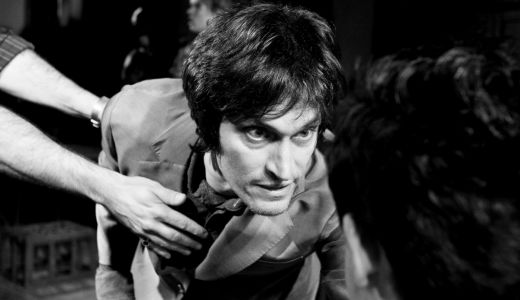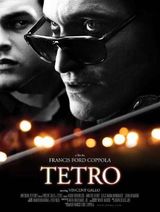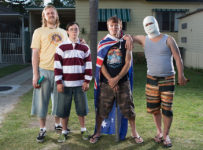The newest film from Francis Ford Coppola is also one of his most personal. In Tetro, the helmer of such classics as The Godfather and Apocalypse Now brings to the screen a tale rich in intimate emotion, featuring perfomances and visuals that are to be savoured.
It is 2008, and 17-year-old American Bennie (Alden Ehrenreich) is in Argentina, on shore leave from the cruise ship that he works on. Turning 18 in just a few days, he visits his long-estranged (and considerably older) half-brother Angelo (Vincent Gallo), who now insists on being known as Tetro. Tetro lives with his warm-hearted girlfriend Miranda (Maribel Verdu, of Pan’s Labyrinth), and works as a lighting tech at a local theatre. A struggling writer, Tetro carries a heart full of pain and a head full of troubling memories. He has long since cut himself off from his family back home, especially his father Carlo (Klaus Maria Brandauer), a brilliant, yet monstrously narcissictic composer. Desperate to connect with his brother and learn more about his family’s past, Bennie – with Miranda’s help – probes into Tetro’s unpublished writings, and sets about bringing these painful memories to the surface in a way both creative and cathartic…
When the opening credits roll on Tetro you are immediately struck by how breathtakingly beautiful it looks. In the decades since Apocalypse Now, One From the Heart and Rumble Fish, Coppola has lost none of his mastery as a visual stylist, and today’s filmmaking technology has arguably helped to make his compositions here all the more intricate and pleasing to the eye. Shot predominantly in monochrome widescreen (in HD), the cinematography of Mihai Malaimare Jr. (who shot Coppola’s previous film, Youth Without Youth) is simply exquisite, infusing the Bueno Aires settings with added mystery and scale. Flashbacks to Tetro’s past are done in a deliberately spartan handheld manner (in 1.85:1 colour) and contrast potently with the present-day scenes. On top of this, Coppola includes a number of dance sequences which enact key chapters of Tetro’s life, and these are infused with bright colours and imaginative visual effects. In lesser hands, such sequences could be written off as self-indulgent (especially when one recreates the Cappelia sequence of The Red Shoes, shown in full early on), but these interludes serve to compliment and augment the narrative. They are also spellbinding to watch.
However, as anyone who has sat through One From the Heart will attest, Coppola’s visual accumen means little when the script isn’t there, but fortunately the director’s screenplay – his first original script since 1974’s The Conversation – is an very fine one. Though not especially autobiographical (Coppola says it is more inspired by emotions and memories from his past, but still a work of fiction), there are elements that any Coppola aficionado will recognise from the man’s own life. It’s impossible not to look at the maddening Carlo and think of Coppola’s own composer father Carmine, while the family tragedies feel informed by the accidental death of his own son Giancarlo, who died in a speedboat accident in 1986. This might be over-reading into the film, but then again the emotions of the piece feel well and truly lived-in.
The cast, led by impressive newcomer Ehrenreich, are all exceptional. Maribel Verdu brings warmth and sincerity and tenderness to Miranda; the venerable Klaus Maria Brandauer is terrific as both Carlo and his brow-beaten brother Alfie; Nine Queens’ Letica Bredice is sexy and hilarious as a flirty, flamboyant stage actress, and Almodovar veteran Carmen Maura makes a small, but memorable contribution as a feared theatre critic. But its Vincent Gallo who makes the biggest impression here. Perfectly cast with his gaunt visage and permenantly haunted eyes, he’s never less than mesmerising. With the ample column inches dedicated to his often-volitile public persona, it can be easy to forget that he really is a damn fine actor, but Tetro reminds the viewer of this fact.
Self-distributed in the U.S. by Coppola, Tetro has taken a bit longer than expected to arrive in Australia, but the wait has been worth it. While the common consensus is that Coppolla will never match (let alone top) his dream run of the 1970s, Tetro is ample proof that for all his career ups and downs, the maestro can still deliver.






No Responses